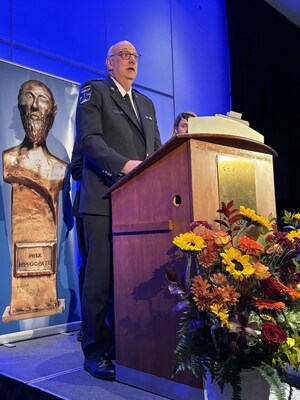MONTREAL, Oct. 27, 2023 /CNW/ – Regulatory para-medicine, including co-assessment and secondary triage, received an important honour during the 14th edition of the Prix Hippocrate ceremony. Each year, this event highlights projects across all disciplines in the health sector. Among the 115 files submitted from across Quebec, the regulatory para-medicine project was selected to receive the Jean-Paul Marsan award. This distinction is intended for projects that have demonstrated a significant innovation leading to a breakthrough in healthcare and social services in Quebec.
Regulatory para-medicine, an alternative to ambulance transportation to emergency rooms, represents a practical contribution to the smooth operation of both the healthcare system and the pre-hospital chain of care. This collaborative approach between a paramedics in the field and nurses brings the right patient to the right place at the right time.
Since this project has been implemented at Urgences-santé, several hundred trips to emergency rooms have been redirected to other resources more appropriate to the patient’s condition, such as a clinic or CLSC.
“We are honoured to receive this award for such a promising project as co-assessment and secondary triage. This unifying project makes it possible to respond even better to a patient’s need. Its concrete impact stems from the involvement of all the links in the pre-hospital chain of care,” said François Charpentier, President and CEO.
During his speech, Mr. Charpentier introduced some of the people at his table to illustrate the pre-hospital chain of care as a concrete solution for an effective healthcare system.
Starting with the first link in the chain, Cristelle Sénécal-Ayotte from Shawinigan, who was awarded a medal for bravery for saving the life of a 68-year-old stranger by applying CPR for 10 minutes while waiting for first responders to arrive in front of her home.
Indeed, the public is an important part of the chain of care. In an emergency, citizens can take direct action to initiate the intervention. Not only can they call 9-1-1, they can also follow the instructions they receive from emergency medical dispatchers.
The second link in the pre-hospital chain consists in the first responders who are trained to respond quickly at the scene. Mr. Patrick Taillefer, Director of the Laval Fire Department, represented first-tier responders.
Mr. Ronald Boudreau, Assistant Executive Director General at Sûreté du Québec, illustrated the accessibility of automated external defibrillators, commonly known as AEDs, in all SQ patrol vehicles across Quebec.
And the entire Urgences-santé team, including all paramedics and emergency medical dispatchers, working together to save lives and reduce morbidity rates associated with a medical condition requiring urgent care.
“In order to ensure the best possible access to emergency care in an equitable manner, we must focus on all the links in the chain. They are all connected, and it starts with citizens who must and want to be involved. Urgences-santé is the integrated management of the entire pre-hospital chain of care in Montréal and Laval, from beginning to end,” concluded President and CEO François Charpentier.
Corporation d’urgences-santé, reporting to the Ministère de la Santé et des Services sociaux, is the largest ambulance service organization in Quebec. It employs some 1,700 people, including over 1,100 paramedics and 100 emergency medical dispatchers who serve residents of Montréal and Laval (2.5 million people).
SOURCE Urgences-santé

Featured image: © healthhlsje




